
The most vibrant music so often takes place at the point where cultures meet, eras overlap, sensibilities intersect, and traditions fork. That in-between space is also the habitat of the aptly named Junction Trio, three stupendous musicians who glory in artistic instability, the sense that styles are not pure or settled practices and never were. John Zorn’s Philosophical Investigations, Charles Ives’s Piano Trio, and Beethoven’s “Archduke” Trio were composed near the start of three centuries on two continents by artistically fearless men with unruly imaginations and a penchant for making a lot of intricate noise. They found kindred spirits in three musicians who are at an age to have accumulated decades of experience but not of rote repetition. Violinist Stefan Jackiw has performed all of Ives’s violin sonatas with Jeremy Denk, cellist Jay Campbell is also a member of the tirelessly self-challenging JACK Quartet, and pianist (and composer) Conrad Tao has fashioned an elegantly idiosyncratic career. The Junction Trio made its Carnegie Hall debut in Weill Hall last week, and while the intimate recital room is the ideal chamber-music receptacle, it’s probably already too small to contain the group’s expanding reputation.
Each member brings his separate passions. Campbell has a close relationship with Zorn, who works like a kind of compositional collagist, slicing whatever music crosses his path into strips, then gluing them together into sequences that are both familiar and jubilantly disjunct. There’s nothing contemplative about Philosophical Investigations, or rather it emulates the experience of watching the city swarm from a bench on a Broadway median: anger bumping into laughter, languages briefly intertwining, a hectic sequence of sprints, strides, and close encounters. I couldn’t always follow the logic in the music’s swerves or a reason for its violent spasms, but the musicians played the piece with such fervent clarity that it seemed self-explanatory at the time.
The concert’s highlight was the Ives Trio, a young man’s work so exuberantly original and ahead of its time that it must have made no sense at all even when he finally stopped tinkering with it around 1915. Ives wove popular and traditional tunes through the score, so that listeners, if there were any, would latch on to scraps of “Marching Through Georgia,” “My Old Kentucky Home,” and “Pig Town Fling.” Distance helps. The tunes have a cozy, antique quality now, and in any case the work’s greatness has nothing to do with a menu of sampled excerpts. Instead, it lies in the vigor and finesse with which Ives mingled small-town nostalgia and urban energy, New England landscape and the constant buzz of nonconformity—qualities that the musicians tended to in every downbeat and syncopation.
What Ives, Zorn, Beethoven, and the Junction Trio all share is an exciting, spongelike irreverence. The world is made of music, and we don’t select most of what we hear any more than we choose what molecules to breathe. Much of the classical-music world, with its history of soundproofed halls and hissless recordings, has organized itself around denying that vital cacophony. In our own time, ubiquitous ear pods isolate people in their own sonic bubbles. But this concert, even in the noiseless cocoon of Weill Hall, evoked the timeless jangle of public life, a culture enriched by constant collisions and relentless curiosity.
Related